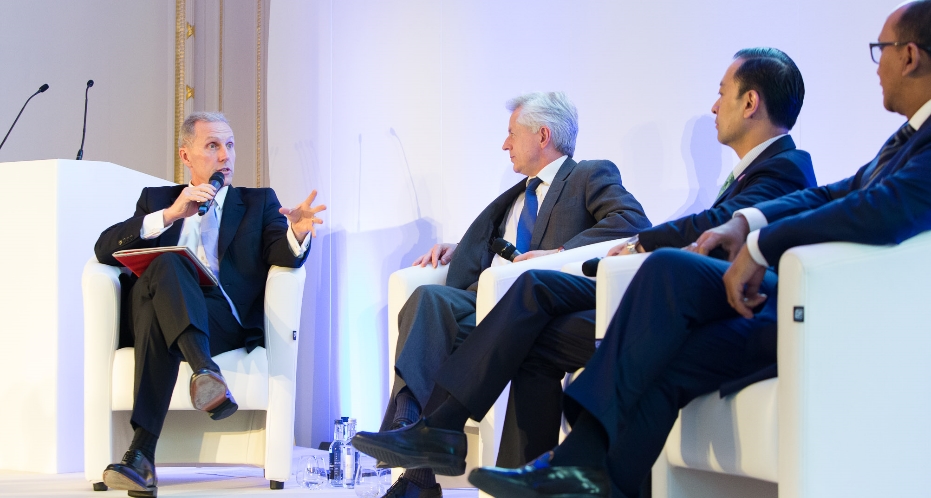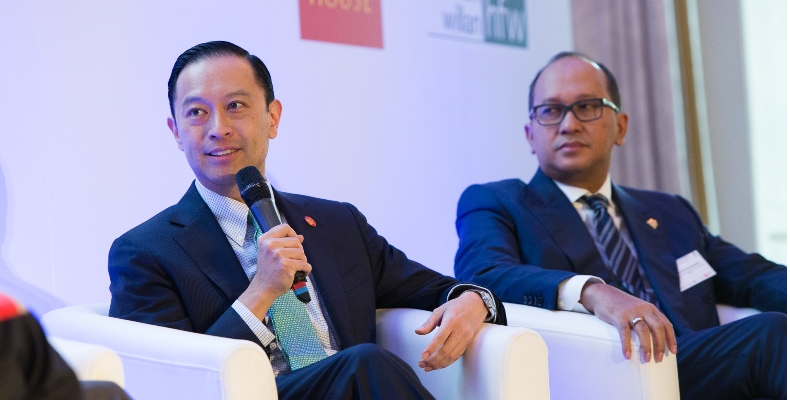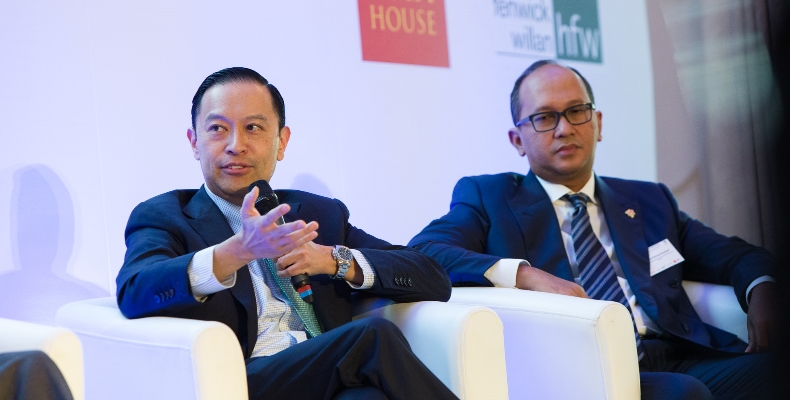Driving commercial and political engagement between Asia, the Middle East and Europe
Driving commercial and political engagement between Asia, the Middle East and Europe
Driving commercial and political engagement between Asia, the Middle East and Europe

The opening up of Indonesia’s economy has a social impact, the country’s Trade Minister Thomas Lembong said, during President of Indonesia Jokowi’s UK trip last week.
But Mr Lembong said that having a clear vision about what needed to be done in the country, which started at the top with President Joko Widodo (known as Jokowi), meant that a change of mindset and a change of culture among the public, was now possible.
Speaking at a panel discussion, chaired by Asia House Chief Executive Michael Lawrence, on the future of UK-Indonesia trade opportunities, during the UK-Indonesia Business Forum, which was held at the Mandarin Oriental Hotel, the Minister of Trade of Republic of Indonesia H.E. Thomas T. Lembong said: “Indonesia became inward-looking and protectionist but Jokowi changed it completely and this starts from the top. The President is good at distilling the fundamental philosophies that underpin our economic reform programme down to two things: openness and competition. He has a very clear-minded vision. It is very difficult for me to take down trade barriers if there is not a clear vision at the top,” he explained.
Bilateral trade between Indonesia and the UK is worth US$2.3 billion and Indonesia has a modest trade surplus, he said.
“We should be trading more with each other. We have not done enough outreach though. We know a lot about you guys but how much do you know about us. We know about Manchester United, One Direction and Arsenal. What do you guys know about us?” Mr Lembong asked.
“Trade is inevitably intertwined with social issues,” he continued. “A change of mindset requires a change of culture. It happens on an ‘S’ curve – at the beginning it seems very slow and you push and things seem to be moving slowly then it reaches a tipping point – it’s like shaking a tomato ketchup bottle – you shake, a bit comes out and then all of a sudden the whole bottle comes out,” he said referring to the change of culture needed in Indonesian society to accept change and undergo reforms to face global competition.
“We need to be patient and consistent, that is what Jokowi always says ‘Be consistent and have faith,’” Mr Lembong, who was educated at Harvard and is a former investment banker, explained to the audience of bankers, professionals, global CEOS and diplomats.

Minister of Trade of Republic of Indonesia H.E. Thomas T. Lembong said: “President Jokowi likes to go into the field and give us a heart attack because we find out that he has been there.” Pictured on his right is the Chairman of Indonesia Chamber of Commerce and Industry Rosan Perkasa Roeslani. Image credit: Chris Renton
“The President is very hands-on and very pragmatic,” he continued. “He wants us to concentrate on concrete measures that are felt directly in the field – the nuts and bolts, not flowery stuff,” he added. “‘What is the problem? Let’s untangle this,'” he said, describing the interactions ministers have with Mr Widodo.
“The President does not like to sit in the office,” he continued in the frank and revealing discussion. “He likes to go into the field and give us a heart attack because we find out that he has been there” he said, to chuckles from the audience.
“We have needed the reforms that we are seeing now for years. Everyone knew what needed to be done but there was a lack of focus on execution,” he explained.
Indeed Mr Widodo has brought out a raft of economic policy packages since entering office in an attempt remove regulations that obstruct business investment, improve the country’s investment climate and attract FDI to the world’s fourth most populous nation. He has also started a massive infrastructure programme part funded by the axing of fuel subsidies.
In response to a question about the the World Trade Organization (WTO) multilateral Trade Facilitation Agreement (TFA), which, similar to Indonesia’s National Single Window (INSW) scheme, aims to ease customs clearance and speed up the movement of goods, Mr Lembong said: “Indonesia has not yet ratified it but who does not want to expedite customs clearance? We are one of the most restrictive regimes in ASEAN. If someone wants to put money in your city why the hell would you say ‘No’.”
He said that regional and global competition was becoming more intense with developments in technology and global supply chains. “We are very conscious of it. We would like to agree more FTAS with the EU and with the USA as these FTAs raise our standards and clean our procedures up giving us higher standards. That is progress. We want to modernise and upgrade our economy. We want to move to higher value-added industries. Jokowi has given us such an opportunity to have a fresh think about what we want to do. There is a big focus on digital services and ecommerce and my hope is that that will shrink the old bones of contention like agriculture to its proper proportion. The 21st century is about technology,” he said.
He said “Indonesian culture” was another area that Indonesia wanted to focus on promoting. “How many times have heads of state spoken about the importance of Islam? We want to bring our successful young Muslims to Europe and we dream of BP, GlaxoSmithKline, bringing young European Muslims to intern here. We are an example of modern Muslims and of the entrepreneurial positive side of Islam. We want Indonesia to be seen as very forward-looking and modern,” he said.

Minister of Trade of Republic of Indonesia H.E. Thomas T. Lembong said: “We are an example of modern Muslims and of the entrepreneurial positive side of Islam.” Pictured on his right is the Chairman of Indonesia Chamber of Commerce and Industry Rosan Perkasa Roeslani. Image credit: Chris Renton
He said the country was looking at opening up the services sector in Indonesia more and he expected to see more cooperation with the UK in the fields of maritime and higher education. “Maritime and vocational skills are very dear to Jokowi’s heart,” he said.
Chairman of Indonesia Chamber of Commerce and Industry Rosan Perkasa Roeslani also stressed the huge infrastructure needs in Indonesia, an archipelago made up of approximately 18,000 islands, saying it needed more power generating plants with a total capacity of 35,000 megawatts, as well as 24 seaports, 15 airports, 3,000 railways, 2,000 roads and 49 dams.
“We are moving in the right direction,” Mr Roselani said. “We have been in a comfort zone for a long time. We need to create jobs and by having more companies coming to Indonesia, it creates jobs. That is the most important thing – creating jobs for young people.”
The UK Prime Minister’s Trade Envoy to ASEAN Richard Graham MP praised UKTI Indonesia, the British Chamber of Commerce in Indonesia, the Indonesia Chamber of Commerce and Industry and the UK-ASEAN Business Council. He said trade in aviation and aerospace was booming and more was happening between the UK and Indonesia in fintech and creative media space. “Every airbus sold to Indonesia has a Rolls-Royce engine,” he pointed out.
“We need lots more energy in trade and investment between the UK and Indonesia. There are lots of good things going on and lots of good things that could be going on. Indonesia’s Investment Coordinating Board BKPM is thriving and they can make it happen. Mr Lembong is right regarding a change of spirit at the top of Government,” he added.
naomi.canton@asiahouse.co.uk
To read about a private briefing held by President Jokowi with Asia House corporate members during his UK visit click here.
To read what President Jokowi said in his keynote speech at the UK-Indonesia Business Forum at the Mandarin Oriental Hotel in London click here.
